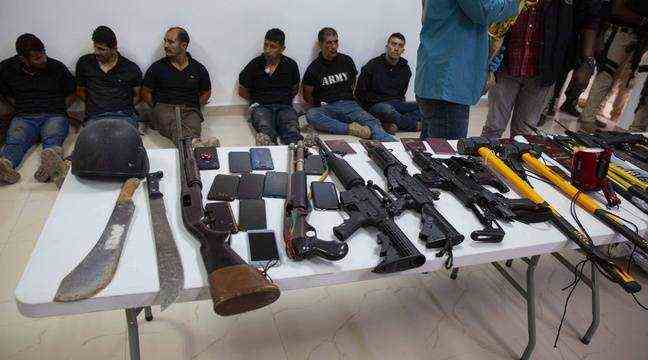The investigation continues in Port-au-Prince this Friday into the assassination of Haitian President Jovenel Moïse, the mystery thickening on the identity of the sponsors who sent the armed commando of 28 assailants, composed of 26 Colombians and two Americans of Haitian descent.
Seventeen individuals were arrested, including fifteen Colombians and two Americans, for their involvement in the murder of President Moïse, riddled with bullets at his home on the night of Tuesday to Wednesday, the country’s police said Thursday evening during a press conference.
Colombian ex-soldiers involved?
“Two (…) who perished in the operation of the (Haitian) police and 15 Colombians whose activity we are currently verifying (…) would have belonged to the national army” and withdrew between 2018 and 2020 , said General Jorge Luis Vargas, the Colombian police chief, at a press conference in Bogota.
Three Colombians also accused of being members of the commando were killed by the police, while eight others were still at large, said Léon Charles, director general of the Haitian police – the results differ slightly according to official sources.
The weapons and equipment allegedly used by the attackers, including machetes, laptops and Colombian passports, were recovered by the police, then exhibited to the press, as were several suspects lined up against a wall and handcuffed.
Acting Prime Minister Claude Joseph spoke by telephone on Friday with Colombian President Ivan Duque, who promised “all the collaboration of his country in advancing the investigation,” according to a statement from his office. At least six commando mercenaries are former Colombian soldiers, Colombian Defense Minister Diego Molano announced Thursday evening.
” We must know “
Paralyzed for several days, Port-au-Prince and the surrounding areas woke up on Friday in apparent and precarious calm, Agence France-Presse found on the spot.
Public transport, banks, petrol pumps, street shops and public administration started to function again, with people jostling in supermarkets to stock up on basic necessities.
“I don’t know what’s going to happen tomorrow or the day after in the country, so I’m preparing for bad days. I buy as a priority anything that can be kept for several days, ”explains Marjory, who does her shopping in a supermarket in Port-au-Prince accompanied by her husband.
Killers from outside
In the country, however, everyone remained on the lookout, trying to understand how such a fatal attack on the head of state could have happened.
“These are foreigners who came to this country to commit this crime. We Haitians are appalled, ”a resident of the capital told AFP. “We need to know who is behind all this, their names, their background for justice to do its job,” he added.
Senior police officials, directly responsible for the security of the Haitian president, are in particular on the spot and summoned to justice, announced Thursday the chief prosecutor of Port-au-Prince, Me Bed-Ford Claude.
No victim police officer
“I did not see any police victim, except the president and his wife. If you are responsible for the President’s security, where have you been? What did you do to avoid this fate for the president? », Asked Me Bed-Ford Claude.
Others even wondered about the possible involvement of these police officers, adding to the confusion. “The President of the Republic, Jovenel Moïse, was assassinated by his security agents. It was not Colombians who murdered him. The latter were contract workers from the Haitian state, ”former senator Steven Benoît said on Magik9 radio on Friday.
This attack further destabilizes the poorest country in the Americas, plagued by insecurity. Two men currently claim to lead the nation of 11 million people, more than half of whom are under 20.
The transitional prime minister takes power
One of the last political gestures of Jovenel Moïse, who died at 53, was to appoint an umpteenth Prime Minister, Ariel Henry, on Monday. But a few hours after the tragedy, it was the Transitional Prime Minister Claude Joseph who decreed a state of siege for two weeks, granting reinforced powers to the executive.
If the opposition accused Claude Joseph of monopolizing power, the UN envoy in Haiti considered that he represented the responsible authority, because Ariel Henry had not yet been sworn in at the time of the assassination. .
The country was already plunged into an institutional crisis: Jovenel Moïse had not organized an election since coming to power in early 2017 and the country has not had a Parliament since January 2020.
In addition, after observing a 24-hour hiatus following the assassination of the president, armed gangs resumed clashes on Friday, paralyzing traffic near Port-au-Prince.

